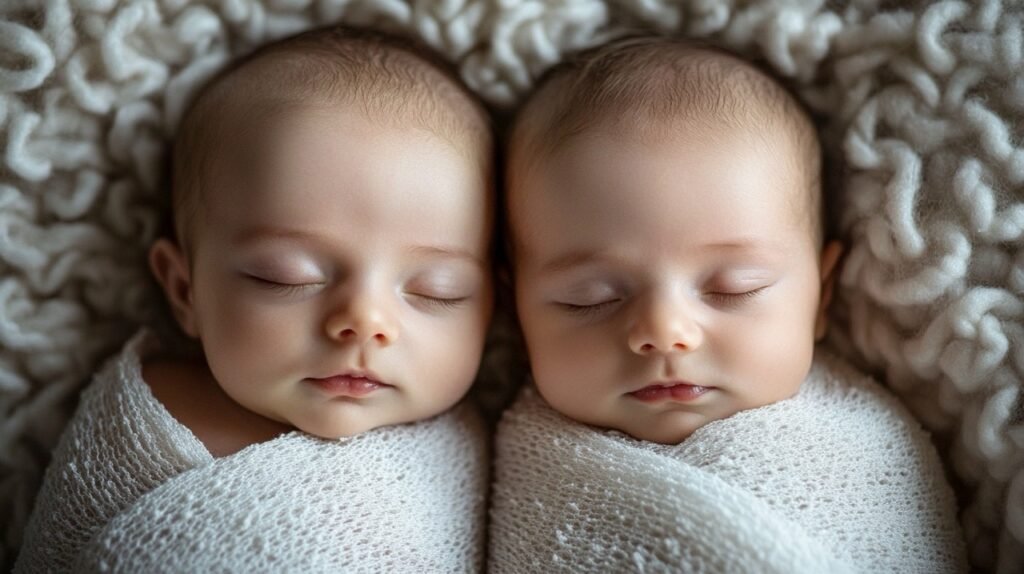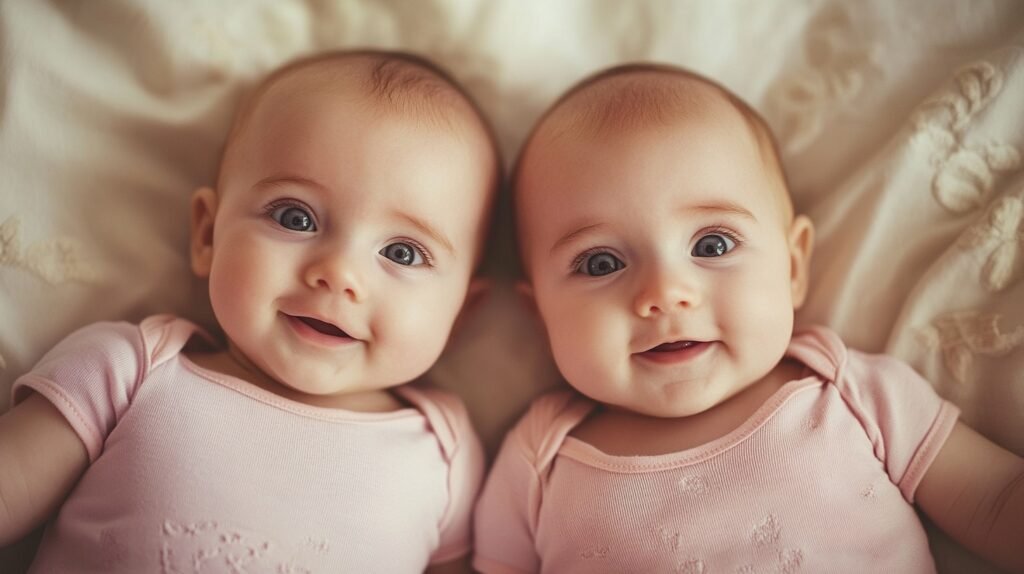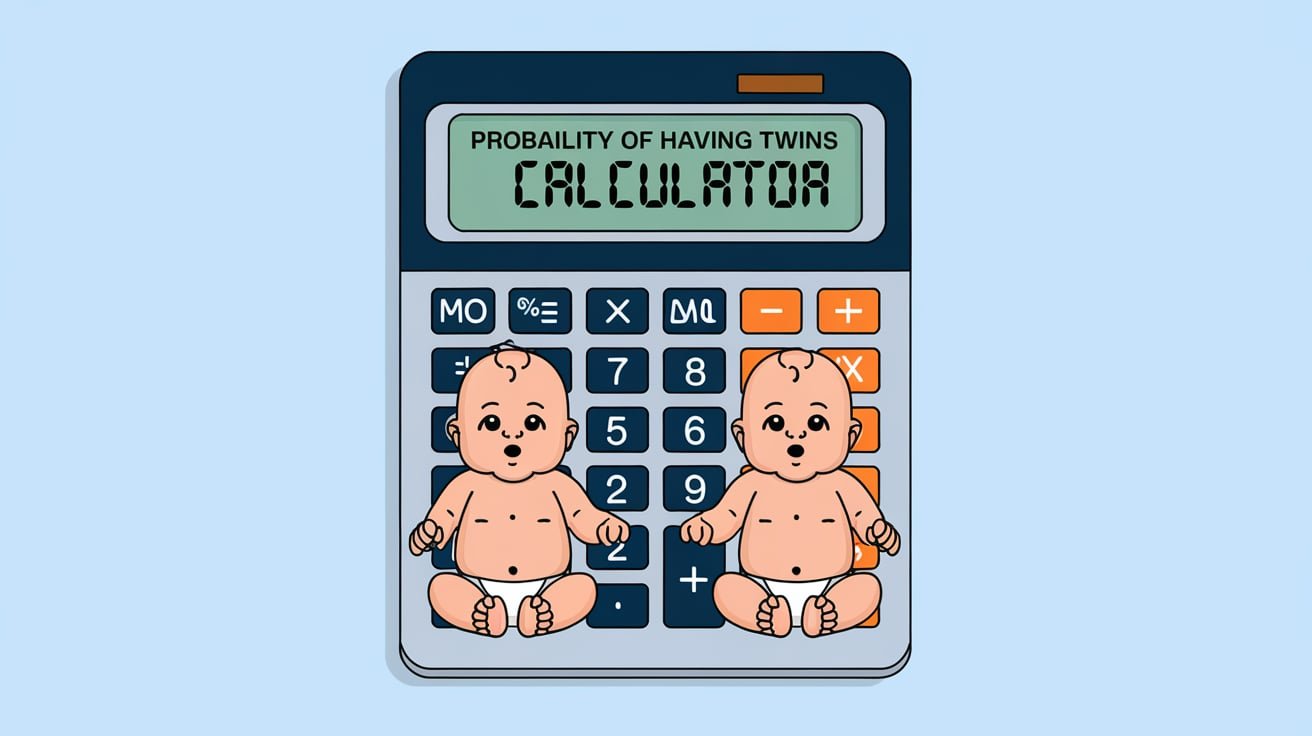Expecting parents often dream about what their future family will look like—will there be a boy or a girl? Will there be one baby, or perhaps two? For many couples, especially those undergoing fertility treatments, the possibility of having twins sparks curiosity and excitement. But how likely is it? What factors can influence the probability of having twins? In this comprehensive guide, we’ll dive into the science behind twin pregnancies, exploring genetics, fertility treatments, and more.
Probability of Having Twins Calculator
Twins Probability Calculator
What Increases Your Chances of Having Twins?
While twins may seem like a magical surprise for many, their occurrence is often rooted in a mix of genetics, environmental factors, and medical intervention. Understanding these factors can help you determine whether you’re more likely to conceive twins.
Family History and Genetics
One of the most well-known factors influencing the likelihood of having twins is genetics. If twins run in your family, especially on the mother’s side, you may have a higher chance of having twins. This is because some women inherit a trait called hyperovulation, meaning they release more than one egg during ovulation. When both eggs are fertilized, fraternal twins are born.
- If you’re a woman with a family history of twins, particularly if your mother or grandmother had fraternal twins, your chances of having twins may increase.
- For men, the genetic link isn’t as direct, but if your partner has a family history of twins, this can raise your odds.
However, it’s important to note that this applies mostly to fraternal twins (non-identical). Identical twins, on the other hand, occur randomly and aren’t influenced by family history.
Age and Race
Age plays a significant role in the likelihood of having twins. Women over the age of 30 are more likely to conceive twins naturally. This is due to a hormonal change where older women produce more follicle-stimulating hormone (FSH), which increases the chance of releasing more than one egg during ovulation.
- Women in their late 30s and early 40s are more likely to conceive twins compared to younger women.
Race also influences twin rates. African women, particularly those of Nigerian descent, have the highest rate of fraternal twins, while Asian women, particularly those from Japan, have the lowest.
After discovering your chances of having twins with the Probability of Having Twins Calculator, dive into the world of genetics further and find out what eye color your baby might have using our Eye Color Calculator! 👁️👶
Fertility Treatments and Twins: The Role of ART (Assisted Reproductive Technology)

Fertility treatments have become one of the most significant factors in the rise of twin pregnancies over the last few decades. Couples struggling with infertility may turn to assisted reproductive technology (ART), which can significantly increase the chances of having twins.
Multiple Embryo Transfer in IVF
In in vitro fertilization (IVF), several embryos may be transferred to the uterus to increase the likelihood of pregnancy. If more than one embryo implants, twins (or even triplets) can result. However, due to the risks associated with multiple births, fertility clinics have started adopting a more conservative approach, transferring fewer embryos to reduce the chances of multiple pregnancies.
- With IVF, your likelihood of conceiving twins depends on the number of embryos transferred and your overall fertility health.
Fertility Medications
Fertility drugs like Clomid and gonadotropins also increase the chances of multiple ovulation. These medications stimulate the ovaries to produce multiple eggs, raising the chances of twins when more than one egg is fertilized.
- Gonadotropins are more potent than Clomid, meaning they have a higher chance of producing multiple eggs and, therefore, twins.
While fertility treatments can raise your chances of having twins, they also come with additional risks, which we’ll discuss later in this article.
Fraternal vs. Identical Twins: What’s the Difference?
Understanding the difference between fraternal and identical twins is key to understanding the likelihood of conceiving them.
- Fraternal twins (dizygotic) occur when two separate eggs are fertilized by two separate sperm. These twins are no more genetically similar than any other siblings. Factors like genetics, age, race, and fertility treatments play a role in fraternal twin pregnancies.
- Identical twins (monozygotic) occur when a single fertilized egg splits into two embryos. This type of twin pregnancy is far rarer and happens randomly. Identical twins share the same genetic material, making them genetically identical.
How Common Are Identical Twins?
Only about 0.4% of pregnancies result in identical twins. Unlike fraternal twins, there’s no known link between genetics or external factors and the occurrence of identical twins. This makes it harder to predict, as identical twinning is more of a biological “accident” than an inherited trait.
Health Risks Associated with Twin Pregnancies
While having twins can be an exciting prospect, it’s essential to understand that twin pregnancies come with added health risks for both the mother and babies. Carrying twins is considered a high-risk pregnancy, which requires closer monitoring and more frequent prenatal visits.
Premature Birth and Low Birth Weight
Premature birth is one of the most common complications in twin pregnancies. Most twin pregnancies don’t go to full term (40 weeks), with many twins being born between 36 and 37 weeks. Premature twins often have low birth weights, which can lead to short-term and long-term health issues.
- Premature babies are more likely to require specialized care in the neonatal intensive care unit (NICU) and may face developmental challenges.
Other Complications
Twin pregnancies also increase the risk of conditions like preeclampsia, gestational diabetes, and placental problems. Preeclampsia, in particular, is more common in twin pregnancies and can be dangerous for both the mother and babies if left untreated.
To minimize risks, doctors recommend that women pregnant with twins receive specialized care from a maternal-fetal medicine specialist. Frequent ultrasounds and monitoring are critical to detecting any potential complications early on.
Twin Birth Statistics: What Are the Odds?

Globally, the rate of twin births varies, but on average, about 1 in 250 natural pregnancies results in twins. However, these rates can vary significantly based on geography and ethnicity.
- In the United States, the twin birth rate is around 33 per 1,000 births, while in Nigeria, the rate is one of the highest in the world, reaching as high as 40 per 1,000.
- With the increasing use of fertility treatments, the number of twin births has been rising globally over the last few decades.
Can You Increase Your Chances of Having Twins Naturally?
Despite many myths floating around, there’s little scientific evidence supporting the idea that specific lifestyle changes can significantly increase your odds of having twins. However, some theories do exist, such as:
- Diet: Some studies suggest that women who consume a diet rich in dairy products may have a higher chance of having twins, though the evidence is not conclusive.
- Height and Weight: Taller and heavier women have been found to have a slightly higher chance of conceiving twins, but these are small factors that aren’t within your control.
In short, while some aspects of your lifestyle might have a minor influence, the chances of naturally conceiving twins are primarily driven by genetics, age, and other factors beyond your control.
Should You Hope for Twins? The Pros and Cons
Before you start hoping for twins, it’s essential to weigh the pros and cons. While the idea of having two babies at once can be exciting, it comes with its own set of challenges.
- Pros: You get the joy of expanding your family quickly, the bond between twins is often strong, and there’s the excitement of experiencing a unique kind of parenting.
- Cons: Raising twins requires double the effort, from the physical demands of pregnancy to the financial costs of raising two children at once. Medical care for twin pregnancies can also be more complicated and expensive.
For couples undergoing fertility treatments, it’s important to discuss your desires and concerns with your fertility specialist to ensure you’re making informed decisions about twin pregnancies.
Conclusion
The probability of having twins is influenced by several key factors, including genetics, age, and fertility treatments. While some elements, like family history, are out of your control, fertility treatments have made it easier for couples struggling with infertility to conceive twins. However, twin pregnancies come with higher health risks, and couples should be aware of the medical and financial considerations involved.
Ultimately, whether you have one baby or two, the most important thing is a healthy pregnancy. If you have concerns or questions about your chances of having twins, consult with a fertility specialist or your healthcare provider to get personalized advice.
FAQ: The Probability of Having Twins
Can diet or supplements increase the chance of having twins?
There’s limited scientific evidence, though some suggest dairy or yams may boost ovulation. Still, genetics and fertility treatments are much more significant factors.
Does IVF guarantee twins?
No, IVF doesn’t guarantee twins, but it increases the likelihood, especially when multiple embryos are transferred.
Can identical twins run in families?
No, identical twins occur randomly and are not influenced by family history, unlike fraternal twins.
What are the early signs of a twin pregnancy?
Symptoms like extreme morning sickness or rapid weight gain can be early signs, but only an ultrasound can confirm a twin pregnancy.
What age increases the chance of having twins?
Women over the age of 30, particularly those in their late 30s and early 40s, have a higher chance of conceiving twins due to hormonal changes.
